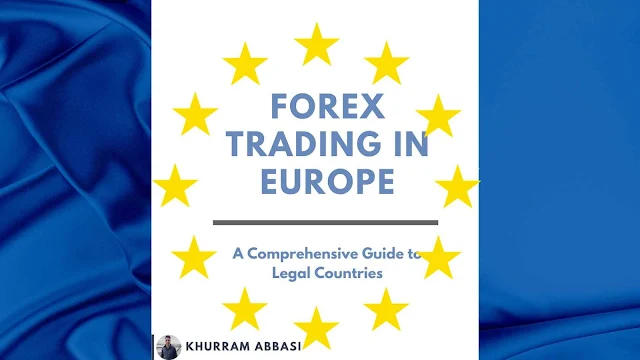Forex Trading in Europe: A Comprehensive Guide to Legal Countries
Forex Trading in Europe: A Comprehensive Guide to Legal Countries
Understanding Forex Trading
Forex trading involves the simultaneous buying and selling currencies on the global market. Its roots in Europe date back to the 1970s with the advent of floating exchange rates. Today, it's a pivotal part of the European financial sector, offering opportunities for investment and speculation.Legal Framework for Forex Trading in Europe
The European Union has established a harmonized legal framework for forex trading, primarily through directives like MiFID II. However, European countries have specific regulations governed by national financial regulatory bodies like the FCA in the UK and BaFin in Germany.Forex Trading in Major European Countries
- Germany: Forex trading is legal and regulated by BaFin. Traders must adhere to strict financial guidelines.
- France: AMF regulates forex trading. There's a focus on protecting investors from high-risk products.
- UK: Despite Brexit, forex trading remains robust, overseen by the FCA.
- Italy and Spain: Both countries allow forex trading under specific regulatory frameworks for investor protection.
Comparing Forex Trading Regulations Across Europe
Regulations vary significantly across Europe. For instance, leverage limits differ between the UK and other EU countries. A comparative table here can illustrate these differences effectively.Getting Started with Forex Trading in Europe
To start trading, one must:- Understand local regulations.
- Choose a regulated forex broker.
- Be aware of tax obligations and reporting requirements.
Risks and Considerations
Forex trading involves substantial risk. Traders must know market volatility, leverage risks, and regulatory compliance. Staying informed about regulatory changes is crucial for legal and successful trading.Future of Forex Trading in Europe
The European forex market is evolving, with technology playing a pivotal role. Regulatory landscapes may shift, and traders should stay informed about these changes.Is Forex Trading Illegal in Any European Countries? Understanding the Legal Landscape
As of my last update in April 2023, forex trading is generally legal across most European countries. This legality extends particularly within the European Union, where financial markets are subject to rigorous regulation and standardization. However, it's crucial to recognize that while forex trading might be legal, the degree of regulatory oversight and legal restrictions can vary significantly from one European country to another.
Some countries have specific restrictions or regulatory requirements for forex trading. These can include but are not limited to, limitations on the use of leverage, mandatory registration of financial service providers with local financial authorities, and adherence to stringent financial conduct and consumer protection laws.
It's important to note that while there are no European countries where forex trading is illegal, the regulatory environment can be complex and subject to change. For the most accurate and current information, consulting the financial regulatory authority of the European country is advisable. Additionally, seeking legal advice is recommended, especially for those considering forex trading in a country they need to become more familiar with. Staying informed and compliant with the latest regulations is crucial to avoid legal complications and engage in forex trading successfully and legally within Europe.
Conclusion
Understanding the legal landscape of European forex trading is crucial for compliance and success. This guide serves as a starting point for traders to navigate the complex world of forex trading across different European countries.FAQs Section
1. What are the standard regulatory bodies overseeing forex trading in Europe?
- In Europe, forex trading is regulated by various national authorities such as the Financial Conduct Authority (FCA) in the UK, the Bundesanstalt für Finanzdienstleistungsaufsicht (BaFin) in Germany, and the Autorité des Marchés Financiers (AMF) in France. The European Securities and Markets Authority (ESMA) also plays a significant role in harmonizing regulations across the EU.
2. How do European regulations impact forex leverage?
- European regulations, particularly those enforced by ESMA, have set limits on the leverage that retail traders can use. These limits protect traders from significant losses and can vary depending on the currency traded. Are there any European countries with unique forex trading regulations?
- While most European countries follow ESMA guidelines, some have additional unique regulations. For instance, Belgium has banned all forms of leveraged forex trading, CFDs, and binary options for retail traders.
4. Can non-European residents trade forex with European brokers?
- Non-European residents can trade with European brokers, but they must comply with the regulations of both the broker’s country and their own. Some European brokers may also have specific policies regarding clients from certain countries.
5. Are there tax implications for forex trading in Europe?
- Yes, forex trading profits are subject to taxation in most European countries. The tax laws and rates vary by country, and traders are advised to consult with a tax professional to understand their obligations.
6. How does Brexit affect forex trading in the UK and Europe?
- Brexit has led to changes in how forex trading is regulated in the UK compared to the EU. UK traders are no longer subject to ESMA regulations, but the FCA maintains strict oversight and protection measures.
7. Is it legal for Europeans to trade with offshore forex brokers?
- While it's not illegal for Europeans to trade with offshore brokers, it's riskier. Offshore brokers may offer a different level of regulatory protection than those licensed in Europe.
8. What should I look for in a European legal forex broker?
- A legal forex broker in Europe should be regulated by a reputable financial authority, offer transparent trading conditions, provide adequate customer protection, and maintain strict compliance with financial regulations.
9. Are there any restrictions on forex trading strategies in Europe?
- Some high-risk strategies, like certain scalping or automated trading, may be restricted or monitored by brokers due to regulatory guidelines.
10. How can I stay updated on changes in forex trading regulations in Europe?
- To stay updated, regularly check the websites of relevant financial regulatory authorities, subscribe to forex news outlets, and consider joining trader communities or forums.


